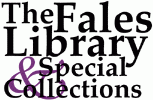Voices from the Food Revolution: People Who Changed The Way Americans Eat--An oral history project conducted by Judith Weinraub
Call Number
Date
Creator
Extent
Language of Materials
Project Description
Voices from the Food Revolution: People Who Changed The Way Americans Eat
An oral history project conducted by Judith Weinraub
Ten years into the 21st century, food is a hot topic. Americans have learned that there are consequences to what we cook, eat, and feed our families. We acknowledge the relationship between our agricultural policy and the country's food system. We recognize cooking as a legitimate and increasingly popular career option and field of study. We lionize successful chefs.
Visitors from fifty years ago wouldn't recognize today's preoccupation with food. They lived in a world where cherished new 'convenience' foods de-emphasized actual cooking, and the shelves at neighborhood grocery stores and supermarkets were lined with increasingly industrialized products. Fine restaurants of the time were mostly French. And nobody thought of taking on the American food system as a legitimate and desirable way to change the world.
But over time, post-WW II attitudes and buying habits as well as the arrival of new immigrant groups, the re-emergence of farmers markets, and a growing awareness of the consequences of eating poorly have slowly redefined our relationships with food.
The key landmarks are familiar, among them:
* Julia Child's books and television shows, which set new paradigms for learning how to cook
* the home cooks who were Child's devotees and demanded new ingredients, and more sophisticated equipment and the retailers who met that demand
* an increasing interest in foods from other cultures and a changing immigrant population that demanded and cooked with new ingredients
* the explosion of new cookbooks and food magazines
* the resurgence and growth of the farmers' market movement
* the huge expansion of the restaurant scene, which welcomed the latest food trends—nouvelle cuisine, comfort foods, regional foods and multi-cultural menus—and made celebrities of the chefs who cooked them
* food television
* an increasing awareness of problems in the American food supply
* the growing popularity of food issues as legitimate political concerns
* First Lady Michelle Obama's campaign to combat childhood obesity
* and, inevitably, the food writers and critics who chronicled these developments in newspapers, magazines, books and blogs
New York has had a defining role in this process.
This project is made up of oral history interviews conducted by Judith Weinraub with some of the people who have played key roles in these developments, among them writers, editors, food critics, farmers market initiators, entrepreneurs, distinguished chefs, and friends and colleagues of the late James Beard. The interviews are accompanied by introductory notes for each participant, as well as transcripts. In accordance with the accepted tenets of oral history interviewing, the participants have been allowed to delete and clarify material in the transcripts.
The interviewees:
In the beginning: James Beard and his circle: John Ferrone, Barbara Kafka, Irene Saks, Jane White Viazzi, Clark Wolf.
The activists: Barry Benepe, Hilary Baum, Dan Imhoff, Dan Barber
The carriers of change: Judith Jones, Gus Schumacher, Michael Batterberry and Ariane Batterberry
The writers and critics: Betty Fussell, Mimi Sheraton, Gael Greene
The entrepreneurs: Michael Whiteman, Reese Schonfeld, Tim Zagat and Nina Zagat
Two seminal educators and an early supporter of food studies: Jacques Pepin, Marion Nestle, Dalia Carmel
Television's Real Top Chefs: Lidia Bastianich, Tom Colicchio, and Madhur Jaffrey
Acknowledgment
NYU Libraries thanks the Leon Levy Foundation for its generous support of Voices from the Food Revolution, an oral history project documenting the development of American foodways of the last half-century.
Subjects
People
Topics
Occupations
Conditions Governing Access
Digital content can be accessed at https://beard.dlib.nyu.edu/.
Conditions Governing Use
Copyright (or related rights to publicity and privacy) for materials in this collection was not transferred to New York University. Permissions to quote or paraphrase from the interviews or transcripts must be obtained from the interviewee or his/her literary estate. Please contact fales.library@nyu.edu. or call 212 998 2596.
